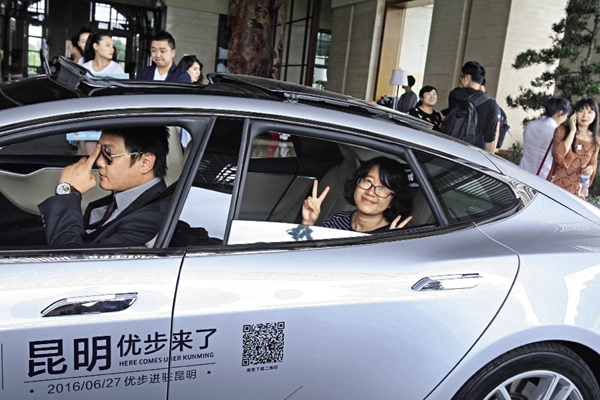The fourth industrial revolution is upon us
- By Xing Wen
 0 Comment(s)
0 Comment(s) Print
Print E-mail China Today, August 8, 2016
E-mail China Today, August 8, 2016
 |
|
Lei Jun, founder of Xiaomi Corp, attributes the company's achievements to "the combination of Internet and substantial economy." |
China's Xiaomi Corp is a good example of making full use of the Internet on the basis of its software and hardware production. Lei Jun, founder, chairman and CEO of the company, attributes Xiaomi's progress from a smartphone manufacturer to third largest e-commerce firm in the country to "the combination of Internet and substantial economy." Via different forms such as producing and joint-stock, Xiaomi has established a hardware ecological chain whose products include smartphones, TVs, and rice cookers, among many others. At the same time, investment in several online platforms has enabled the company to build a software ecological chain that offers rich contents and applications for its hardware. What's more, Xiaomi streamlines supply chain by virtue of Internet technology to provide consumers with products that exhibit better cost performance. Lei expressed his willingness to help other firms emulate the Xiaomi mode – a move that he believes will enhance progress in every sector.
Unavoidably, an industrial upgrade has impact on certain industries. But on the other hand, it brings about new ones. In a sense, the new industrial revolution does not necessarily mean disaster for traditional industries. Travis Kalanick, CEO and co-founder of Uber Technologies, raised the point that the sharing economy brought about by the Fourth Industrial Revolution has effectively created an entrepreneurial ecosystem. Take his company as an example; based on sharing economy theory, this online transport platform has enabled people to work according to their own schedules through efficiently matching the demands of drivers and clients. Rather than being working-stiff employees, every one of us is entitled today to work in a more flexible way and to venture into entrepreneurship to some extent. Kalanick noted that there is an entrepreneurial ecosystem under the "Internet plus transport" mode. He also commended the government's embrace and encouragement of entrepreneurship and innovation, which has given China leading status in the entrepreneurial ecosystem.
As they continually adjust and adapt to new development modes, companies at the same time influence other traditional industries. Liu Zhen, strategic chief of Uber China, has noticed that the increasing number of new transport platform users is changing such industries as automobile manufacture, road construction, insurance, and ways of payment, to name but a few.
 |
|
Uber shows interest in cooperating with more Chinese firms to contribute more to the country's economic transformation. |
New growth drivers play a vital role in upgrading traditional industries. According to Feng Fei, there have been successful case scenarios in this regard. For instance, intellectual manufacturing has now been introduced into iron and steel industry, and the tailor-made mode is applied in the textile and garment fields. The host city of this year's forum indeed displays a promising prospect as regards transformation and upgrade. As one of China's time-honored industrial bases, Tianjin relied on traditional industries for decades. In recent years, however, its growth drivers are shifting to industries featuring new material and new energy, such as biotechnology and electric vehicles. Meanwhile, Tianjin invests more in overseas high-tech industries than traditional industries, and has shifted from resource acquisitions to technology acquisitions.
China's traditional industrial enterprises are upgrading, and new companies are on the rise, posing unprecedented challenges to the growth of multinational companies in China. Nevertheless, this doesn't affect their confidence in the Chinese market. The Accenture Strategy and FT Intelligence survey carried out in September 2015 revealed that 71 percent of the 119 interviewees, who included top executives of transnational companies in China, plan to increase their investment in China in the coming years. In his dialogue with certain business leaders attending the June forum, Premier Li Keqiang stressed that the involvement of foreign companies in China's industrial upgrading will introduce new technologies and managerial experience, which can be of help to Chinese companies. On top of that, to heed and adopt the views of such companies will help the Chinese government improve its institutions and provide them with better services. "China is still the most promising investment market in the world and should be the world's most attractive investment destination," Li said.
Facing the changing market amid the new industrial revolution, multinational enterprises are advised to give full attention to precision marketing and an innovative spirit – new crucial factors if they are to succeed in China's market. Meantime, the importance of collaborating with local firms should never be underestimated. Jaguar Land Rover, for example, has built a joint venture with Chinese automaker Chery in China to meet the demands of local consumers. Further, Uber has shown interest in cooperating with China's small and medium-sized firms, so to contribute more to the country's economic transformation.
A future to embrace
Despite being amid a difficult transition, China nevertheless boasts its own cutting edges. Mio Takaoka, executive director of the New Business Planning Office at Japan's Monex Group, believes that China stands out in terms of its favorable environment for innovation, professionals with global perspectives, and initiators with entrepreneurial spirit, as well as its considerable amount of clients who welcome new products and new services. Chairman of Dutch multinational Royal DSM Feike Sijbesma, who was among the co-chairs of this year's meeting, also expressed confidence in this regard. In his view, the fundamentals of China's economy remain good. Besides, the country owns excellent infrastructures and a growing middle-income group. Sharing the experience of Royal DSM, which has shifted from coal mining to the health, nutrition and materials sectors, Sijbesma suggested that Chinese companies should continue to study various development philosophies while daring to weed out obsolete products and venture into wider fields.
As technology advances at such a fierce clip, a sense of uncertainty about the future permeates the world. The key to embracing the explosion of new technologies is rooted in overcoming fear, and supporting cooperation and failure tolerance. "Forgiveness should be fundamentally part of the human condition if we want people to overcome their fears. That is to say, we need to be forgiving of people who make mistakes if we want to encourage them to innovate," R. May Lee, dean of the School of Entrepreneurship and Management at ShanghaiTech University, said. What's more, a remarkable leadership is also very helpful for overcoming fears in times of great market volatility. "Leaders must be much clearer and stronger in explaining how they envision the future," Marc R. Benioff, chairman of Salesforce, observed. In his eyes, as the country faces the challenges of transforming its economy amid downward pressure, China's leadership has projected an inspiring long-term vision.
Nevertheless, challenges should not overshadow the benefits that the revolution generates for humans. Navdeep Bains, minister of Innovation, Science and Economic Development of Canada, and another co-chair of the meeting, did not consider the occurrence of the Fourth Industrial Revolution itself as a challenge, but rather ensuring that its benefits help the many and not just the few. Cloud platform is an example of a new technology that convenes various voices, inspires impressive ideas, and finally reflects public opinions through decisions made according to such system.
Now that the Fourth Industrial Revolution is upon us, it would probably wise to weigh anchor, focus on the long term, and delight in sharing, so better embracing the future.






Go to Forum >>0 Comment(s)